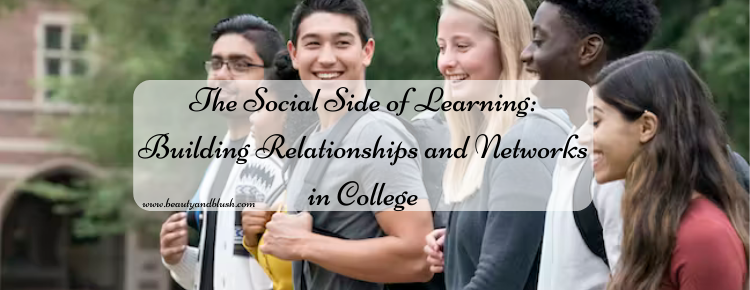The Social Side of Learning: Building Relationships and Networks in College
Hello Everyone,
In the dynamic landscape of higher education, learning extends beyond textbooks and lectures. College offers a unique opportunity for students to cultivate their academic prowess and social acumen. The journey through college involves more than just classroom interactions; it encompasses building meaningful relationships and networks that play a pivotal role in personal and professional growth. This article delves into the often-underestimated social aspect of learning in a college setting, highlighting the importance of forging connections, collaborating with peers, and nurturing a network that can last a lifetime.

1. The Power of Connections: From Strangers to Lifelong Friends
College functions as a vibrant tapestry of diverse individuals, offering a fertile ground for nurturing connections that go beyond lecture halls. Through various avenues ranging from orientation events to study groups and extracurricular engagements, students have countless chances to interact with peers from varied backgrounds and interests.
These initial encounters, when coupled with modern digital aids such as the versatile homework platform offered by https://123homework.com/do-my, can burgeon into friendships that not only provide emotional sustenance and intellectual inspiration but also endure the rigors of academic pursuits and the chapters that follow. As meaningful dialogues are kindled, experiences are shared, and commonalities are discovered, a robust foundation is laid for bonds that stand resilient against the passage of time.
2. Collaborative Learning: Expanding Horizons Through Peer Interaction
Learning is a collaborative process, and the exchange of ideas with peers can enhance comprehension and critical thinking. Study groups, project teams, and interactive discussions foster an environment where students challenge each other’s perspectives, share insights, and collectively grasp complex concepts. By engaging in collaborative learning, students deepen their understanding of subjects and also develop essential skills such as effective communication, teamwork, and adaptability—skills that are highly valued in both academia and the professional world.
3. Mentorship and Guidance: Nurturing Relationships with Professors
Building relationships with professors is more than seeking academic guidance; it’s about tapping into a wealth of knowledge and experience. Professors can provide valuable insights into a chosen field, offer personalized advice, and serve as mentors who can shape a student’s academic and career trajectory. Establishing a rapport with professors through office hours, class participation, and collaborative research can lead to opportunities for internships, research positions, and letters of recommendation that open doors to future success.
4. Networking for Career Development: From College Halls to Professional Halls
The relationships formed in college can extend far beyond graduation, becoming instrumental in one’s professional journey. Campus clubs, career fairs, and alumni events offer platforms for students to connect with individuals who share common interests or have achieved success in their chosen fields.
Networking in college provides a unique advantage, as it facilitates the creation of a foundation that can later be leveraged for internships, job referrals, and industry insights. Cultivating a diverse network during college can play a pivotal role in kickstarting a fulfilling career.
5. Cultivating Social Intelligence: A Skillset for Life
Beyond academic knowledge, college is a prime time for developing social intelligence—a skillset encompassing emotional awareness, empathy, effective communication, and conflict resolution. Engaging in diverse social interactions exposes students to different viewpoints and cultures, fostering a heightened understanding of the world around them. These skills are not only integral for personal relationships but also crucial for excelling in leadership roles, navigating professional settings, and contributing positively to society.
Conclusion
In the intricate tapestry of college life, the threads of social connections are woven alongside academic achievements, creating a mosaic of growth and enrichment. Embracing the social side of learning equips students with not only knowledge but also the interpersonal skills and networks necessary to thrive in a rapidly evolving world. By cherishing the friendships formed, collaborating with peers, seeking guidance from mentors, leveraging networking opportunities, and honing social intelligence, students can navigate the complexities of both their educational journey and the path that lies beyond graduation. Embracing the social dimension of learning fosters a holistic approach that prepares individuals to not only excel in their chosen fields but also to contribute meaningfully to their communities and the global arena.


